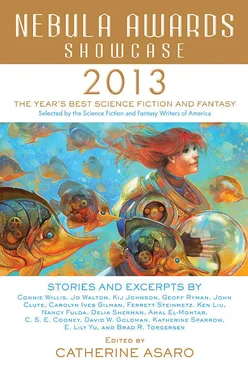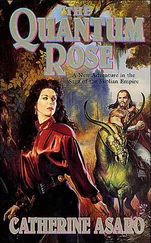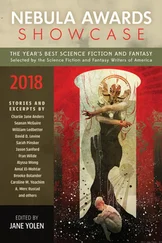Sophie gaped at her. “You can’t talk to me like that!”
Mammy got up from her desk and slapped Sophie across the face.
Sophie put her hand to her stinging cheek. “You hit me!”
“If you don’t keep your thoughts and your eyes to yourself, I’ll do more than that.” Mammy took Sophie’s arm in a firm grip. “You need to learn your place, girl. You can sit in the linen room for a spell, think things over.”
* * *
Locked in the linen room, Sophie had plenty of time to plan what she was going to say to the Creature when it showed up, about throwing her into an adventure and then just abandoning her. She tried to think what she might have said to the Fairchilds to persuade them she wasn’t a slave, moved on to imagining how Mama would have handled Mammy, and spent some time worrying over whether Mama would think she’d run away and call the police.
If Mama even noticed.
Sophie closed her eyes, clicked her bare heels together, and repeated “There’s no place like home” until she started to cry. When she was cried out, she wiped her face on her apron and distracted herself by poking through the sheets (heavy linen) and towels (heavier linen). She stood by the window and watched the shadow of the Big House creep slowly over the geometrical beds of the formal garden. Mid-afternoon, she saw a procession of slaves trotting into the house carrying big tin boxes slung on poles. She wondered what was in the boxes. She wondered if anybody was going to give her anything to eat.
Time passed. The shadows crawled. She wished she had something to read.
The slaves brought the boxes out again and carried them around the corner of the house and out of sight. The light faded, palmetto bugs whirred against the ceiling and shadows of hunting bats flitted silently across the sky. And then it was night, and a slave she hadn’t seen before was at the door with a lantern, telling her to come along.
“Mammy, she say you sleep in the Quarters tonight, maybe it teach you to mind you manners.”
As the slave girl led her through the fragrant, buggy darkness, Sophie leaned that her name was Sally, that she was a housemaid, and just about the nosiest person Sophie had ever met. Too tired to think of any answers to her questions about New Orleans and Sophie’s mother and Mr. Robert, Sophie just shook her head, which brought on a furious speech about folks who thought they were better than other folks that kept Sally busy until they reached the oak grove.
“See this here?” Sally swung the lantern to illuminate the first few feet of a narrow path. “Just follow it on a ways, and you come to the Quarters. Africa say she take you in, the good Lord know why. First cabin to the right.”
It’s not easy to follow a path you can’t see. Sophie groped her way forward step by step, jumping at every noise and stubbing her bare toes on every stick and stone. By the time she reached the end of the trees, she was jumpy as a cat. She also needed a bathroom.
In front of her, a double row of cabins glowed faintly in the moonlight, their doors open to catch whatever breeze should happen to chance along. Behind them, a field of young cane rustled sleepily to itself, and cicadas fiddled wildly.
Sophie climbed to the porch of the first cabin to the right and peeked cautiously through the uncurtained window. Firelight flickered on the face of the slave woman who’d given her the corncake, stirring an iron pot hung over the fire on a hook. On the floor, a child was playing with a baby, and three men sat around a rough table, their faces grim in the flickering light of a smoky candle.
Sophie’s pulse stuttered nervously. The men looked just exactly like the kind of dirty, ragged Negroes Mama had warned her against, except they were all working. One was stuffing a sack with what looked like a tangle of black thread; the second was sewing another sack closed. The third man sat in the only chair in the room whittling with his head bent like he was too tired to hold it up. Around them, the walls were covered with clothes and tools hung on hooks; baskets and bunches of herbs dangled from the ceiling. The air was still and hot and thick with grease and sweat and small, biting insects.
If there’d been anywhere else to go, Sophie would have crept away again. As it was, she hesitated until the child looked up and saw her at the window. “Who that?”
Sophie moved shyly to the door. “Sophie.”
The child scrambled to its feet. Sophie couldn’t tell whether it was a girl or a boy, its hair trimmed like a lamb’s wool close to his head, its bony body covered by a coarse brown shirt. “My name’s Canada. You come to supper?” The child took Sophie’s hand and pulled her forward. “This here’s Sophie. She ain’t borned here.”
“She sure as shooting ain’t,” one of the men said. “Dr. Charles a good Christian gentleman. Ain’t it just like Mr. Robert, though?”
Africa turned from the fire. “Hush, Flanders. Ain’t her fault who her pa is. Come here, sugar.”
Sophie edged around the table, clutching her skirt so she wouldn’t touch anything.
“This here’s my husband, Ned.” Africa laid a gentle hand on the skinny man’s shoulder. He raised his face, pale brown and deeply lined.
“Pleased to meet you, sir,” Sophie said shyly.
Ned showed a graveyard of yellow teeth in a wide smile. “I pleased to meet you, too, child.”
“The boys are Poland and Flanders,” Africa said. “The baby’s Saxony. Tote me some water, Canny girl. I’m making us some spoon-bread to welcome Sophie to Oak River.”
By this time, Sophie was ready to burst. Not wanting to ask about a bathroom where the men could hear, she followed Canada outside. But she couldn’t make her understand.
“I don’t know ’bout no bathroom,” the little girl said. “The water in the cistern here’s for drinking. Sometimes we washes in a barrel, but in summer, mostly we swims.”
“I don’t have to wash,” Sophie said. “I have to tinkle.”
“Tinkle?”
Sophie was ready to die of embarrassment. “Pee.”
Giggling, Canada led her to a little wooden house out in the field behind the cabins. It smelled foul, it was full of flies, and there wasn’t any paper, only a basket of scratchy moss to clean up with. Sophie was past caring.
Supper was greens and a little chicken and the water they’d been boiled in—pot liquor, Africa called it—and a deliciously creamy spoon-bread, eaten more or less in silence, which suited Sophie just fine. She was tired and frightened, and hadn’t the first idea what slaves liked to talk about.
As soon as the last crumb of spoon-bread disappeared, Canada and Africa cleared the table, Poland put the baby to bed in a basket, and all three men went out into the night—to hoe their vegetable-patch, Canada said. Sophie sat in Ned’s chair, trying to keep out of the way and wondering where she was going to sleep.
A woman came to the door asking Africa to step round to the Big House, as Korea’s baby was on the way. Africa bustled around pulling gourds and dried plants from the rafters and tying them in a sack, then left in a hurry.
Canada yawned. “Time we go to bed. Momi, she sometimes out all night when a baby come.”
She took Sophie’s hand and led her into a tiny back room. Sophie could just make out two ticking mattresses, covered with pieced quilts, taking up most of the floor space. Canada gestured to the smaller one. “This my bed,” she said. “But you can share.”
Sophie had never shared a bed in her life, and didn’t want to start now. But there wasn’t any place else to sleep. She began to cry helplessly.
“Aww,” Canada said. “You homesick for you Momi?” She put her skinny arms around Sophie’s waist and her head against her shoulder. “Don’t you cry. She send you a message, I ’spect, next boat from New Orleans. You going to like it here. Folks is nice, mostly, and Old Missy and Dr. Charles, they don’t believe in whipping ’less you do something real bad. Lie down now and go to sleep. Everything look better in daylight. You wait and see.”
Читать дальше












